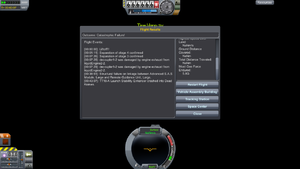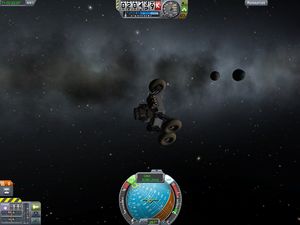Deep Space Kraken
The Deep Space Kraken was the name given by the community to a bug prior to version 0.17. The name Kraken comes from the legendary deep sea creature that supposedly attacked and sometimes destroyed sailors' ships, a good analogy for 'something' unexplainedly attacking and destroying players' ships. Since the original bug was fixed, "Kraken" has become a symbol for many bugs, which are often not related to the original bug.
The Deep Space Kraken was a famous bug and is namesake of other bugs in Kerbal Space Program. It was removed with version 0.17. The bug could be triggered by moving at high velocities in the game. The cause was that KSP prior to 0.17 would move the ship in space, instead of moving space around the ship. The high velocities caused floating point errors in the code which caused parts to be slightly misaligned or misplaced on the ship which would in turn cause the physics engine to detect the parts breaking off or colliding.
A fix was implemented in 0.17, involving offsetting velocity to the universe around the vessel meaning that the focused vessel will always be at a low speed. However, this caused a similar bug to appear, called the Deep Space Cthulhu, which can break apart ships when quickly switching out of high time accelerations (as of 0.17). Another side effect of this fix is that the Kraken can strike vessels which are passed closely and at very high speed, because the speed is offloaded to them instead of the active vessel.
Contents
Fan-attributed Krakens
This is a list of bugs that are attributed to the Kraken bug but are not related to the actual bug.
General Kraken
General Kraken or The Kraken mainly occurs during interplanetary travel. General Kraken only breaks a few parts of a spacecraft which may then collide and result in explosions. The Kraken may also force parts slowly through each other and result in catastrophic explosion. Unlike the Cthulhu, the Kraken tends to attack when exiting the Map View and IVA mode.
Gyro Kraken
Gyro Kraken is when a spacecraft will spin around and vibrate so intensely that the spacecraft will be obliterated. The rate of spinning is so extreme that it is impossible to be replicated manually. This is actually a bug with parts clipping through each other and colliding with each other, causing what is also known as 'ghost forces'. On occasion, it will appear as though something is hitting your craft at high speeds rather than just spinning out of control.
Warp Kraken
Warp Kraken is a bug that attacks Kerbals exiting spacecraft that have just come out of a high time warp. Upon contact with the surface the bug causes the kerbal to be shot out of the solar system at an insane velocity (possibly exceeding the speed of light) while destroying all spacecraft in the vicinity.
Deep Space Cthulhu
Deep Space Cthulhu is a fan-made term for a version 0.17 bug similar to the Kraken, except it only seems to attack when exiting high time warp speeds. Instead of adding phantom forces, Deep Space Cthulhu instead tends to detach parts from one another. In milder, yet more infuriating forms, Deep Space Cthulhu will instead detach small groups of engines, making it impossible to perform orbital burns. Cthulhu is a cosmic entity from H.P. Lovecraft's novels, and bears a slight resemblance to a Kraken. It has been reported that Cthulhu can attack ships that are still on the launch pad when coming out of a high time warp.
Wormhole Kraken
The Wormhole Kraken has been reported to affect ships as they are leaving Kerbin's atmosphere. If there is a lot of weight below a decoupler (which is most likely also the center of mass), the rocket will clip through itself. While in Kerbin's low atmosphere, the bottom part of the link will start moving faster than the top due to the normal acceleration. Once the top of this broken part passes the actual top of the rocket, the entire rocket will obliterate itself, leaving no two pieces attached.
Hell Kraken
The Hell Kraken is a bug which was discovered during the 0.21 version. It seems to strike when a kerbonaut on EVA hits a celestial body's surface, causing the screen to turn black, with the UI remaining though. The altitude will remain at 2/3Mm which displays as "666,666m". As of version 0.23, the altitude GUI will display "666,666", and will change numbers rapidly like so: "666,666"-"555,555"-"444,444", etc. The gyro ball also disappears, and when returning to the space center, the screen remains black and the game must be manually closed from the desktop. This kraken is particularly dangerous because when encountered on the surface of a planet, it causes all craft in the vicinity to be destroyed, and those left are shot out of Kerbol orbit.
NaN Kraken
The NaN Kraken is a bug which can only be evoked if the orbits of celestial bodies are altered, via a mod or the alteration of the game's code. If a ship is on the surface of a planet, and another planet is suddenly moved so that the craft is within its SoI, the sudden change in gravity will cause the craft to go towards the latter at incredible speeds, and will sometimes even go through a planet to accomplish this. Please note that the gravity of the second planet does not have to be greater as only one gravity source is allowed at any given time.
Kore Kraken
This bug was discovered in KSP version 0.22. This type of Kraken will only occur when parts somehow manage to come to rest below the surface of the sea of Kerbin. When resumed some parts may not make contact with the ground and can actually float through the ground and towards the core of the planet. When the parts get near enough to the core of the planet, they will gain extreme speeds (about 97.8% of the speed of light) and shoot out towards infinity, not actually hitting the far side of Kerbin (likely because tic-based physics at high speeds can easily "miss" collisions) when they shoot out.
6 Death Kraken
The 6 Death Kraken attacks mostly during early launch stages. It strikes craft that are inside of Kerbin's atmosphere. Around 6,000 meters, at random, the craft will accelerate suddenly, blasting out of view. The trajectory will wobble extremely fast. The engine sound will become warped and robotic-sounding. It is impossible to recover from this form of the Kraken, as the craft is out of view and extremely likely to crash. It may strike repeatedly.
Ass Kraken
The Ass Kraken, discovered by forum user Clockwork13, is a rare kraken that occurs while loading quicksaves. It makes the screen get completely wiped out by those red fire particles that can be seen when entering atmospheres. The screen then turns white, and the game needs to be manually closed. Once the game is restarted, all of ships will disappear except for EVAs and Flags. Occasionally debris in orbit around the sun will survive. When reopening the save, it says that the parts to just about all of ships are missing. This doesn't just affect ships but also affects the research. All archives go unharmed, but random parts go missing. The node is still researched, just a lot of parts require another entry fee to gain access to them again. This is probably the most devastating, but rarest kraken.
Ghost Kraken
The Ghost Kraken is a bug when entering time warp. The ship being controlled will bend until most of the parts have detached. Phantom forces will pull parts down to the planet until they crash into it. It is possible that when you reselect the ship's command pod the ship will duplicate itself and will be okay. It is impossible to time warp while being affected by this kraken because the parts are under acceleration.
Twin Kraken
This kraken has only been confirmed twice, and causes a duplicate of a vessel to appear at the coordinates of docked vessels in orbit. This may happen on docking or later. In one instance, the duplicate could only be viewed in map mode, and when selected revealed no parts, no velocity, and the player was unable to rotate camera or exit to space centre. In the other, the vessel was destroyed by the duplicate colliding (from inside) with it. (instance two was in Scott Manley's Interstellar Quest, when Space Station one exploded.)
Changes
- (Bug fix) 'Off loading' velocity to the universe alleviated this problem, though it still exists in 'new' form.


